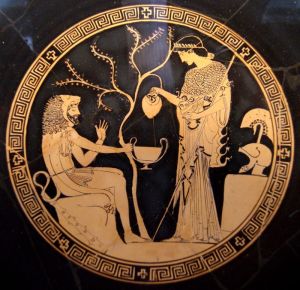Balladeer’s Blog takes another look at the surviving fragments of an ancient Greek comedian, in this case Crates.
 CRATES – Crates’ career spanned from approximately the 450s B.C. to the 430s B.C. We have fragments from nine or ten comedies from an unknown total output. From other sources we know that comedies as stage productions began sometime around 500 B.C. or earlier so Crates came fairly early to the artform.
CRATES – Crates’ career spanned from approximately the 450s B.C. to the 430s B.C. We have fragments from nine or ten comedies from an unknown total output. From other sources we know that comedies as stage productions began sometime around 500 B.C. or earlier so Crates came fairly early to the artform.
Crates was credited with being the first Athenian comic poet (the comedies were written in verse and included songs) to introduce drunken characters, still a comic staple over 2,400 years later. Aristotle himself credited Crates as being the first to abandon the “glorified comic monologues” approach of the oldest comedies and introducing fleshed-out plots and storylines.
Be that as it may, there is still a great deal of academic arguing over whether or not Crates’ work simply reflected the influence of Epicharmus, who may well have been the TRUE innovator.
Crates was supposedly an actor before he began writing comedies (But I’m sure he really wanted to direct. – rimshot – ) and his brother was Epilycus, one of the Epic Poets. Eusebius’ Chronicles stated that Crates was a well-known comedian by 451 B.C. and Demetrius Lacon in his work On Poetry indicates that Crates may have acted in some of Aeschylus’ tragedies before switching genres.
KNOWN WORKS
 NEIGHBORS – We do not have even a hypothetical year for this work, unfortunately. Since titles sometimes referred to the all-important Chorus of a Greek comedy there is speculation that the chorus members were “Neighbors” of some sort (Duh!) but nothing is known about the plot.
NEIGHBORS – We do not have even a hypothetical year for this work, unfortunately. Since titles sometimes referred to the all-important Chorus of a Greek comedy there is speculation that the chorus members were “Neighbors” of some sort (Duh!) but nothing is known about the plot.
Athenaeus argued that Crates’ use of a drunken character in this comedy PRE-DATED Epicharmus’ use of stage drunks, so apparently even back in ancient times this was being debated.
The closest thing to an intact joke from the fragments of Neighbors is a lecherous reference to the delectable young males and females on hand serving whatever feast was being celebrated in the comedy. For today you could insert a Harvey Weinstein or Kevin Spacey type of joke, I guess.
The next closest thing to an intact joke is a possibly wry reference to ” playing at pessoi” which could refer both to pebbles used in a board game and pebbles used to wipe one’s bottom after defecation. Since the ancient Greek comedies are LOADED with scat jokes it’s possible that a very grotesque mix-up occurred.
Other fragments from this comedy are virtually useless: “I do not possess a lampstand.” (I want a T-Shirt that says that, dammit!) … “You must be quiet and not make a sound.” … “And had an aroma like sweetest myrrh.” … “If you’re smart, boy” … “A pig through roses” … “You led astray” … and “Scooping out a trough.”
LAMIA – This comedy dealt with the ancient Greek she-monsters called Lamia. In recent decades popular fiction – especially on television – softened the nature of Lamia to make them seem like vampires.
In reality Lamia would steal children from their beds and carry them off to eat them. The creatures had filthy hygiene habits (The Lamia, not the infants. Although …), wielded walking sticks, could pull out their eyes and replace them and – most disgustingly – would let loose with particularly noxious flatulence in order to escape potential danger.
The monsters descended from the tragic woman named Lamia, who was one of Zeus’ lovers. Zeus’ wife Hera punished Lamia by killing all her children and making it so she could not sleep, so that she had no escape from her grief.
Zeus took pity on her and granted her limited shape-changing abilities and the power to remove and replace her eyes so she would not have to see other women’s children.
The surviving lines of this comedy are the usual random collection of non-sequiturs.
HEROES – The ancient Greek use of the word “heroes” was a bit different from ours. Heroes back then were mostly regarded as figures whose accomplishments when they were alive led to them being virtually or literally worshipped after death.
We have no idea regarding the plot, just the title and the following lines: “If true, then he wasn’t frightening them with a wineskin.” … “You must deliver a bowl of soup and porridge.” … “Raise your neck from the ground to look at them.” … “Use jumping weights the size of sacks of grain.” … “To me the mattress seems to stretch beyond the end of the bed.” and “In a wicker dung container.” (Hey, I warned you. Scatman Crothers would think there was too much scat in ancient Greek comedies.)
GAMES – Given the title and the very few fragments of this comedy the speculation is that the story centered around games like Cottabus, which were played by adults at Athenian parties.
One fragment even refers to “the Kissing Game” and how a certain female cheated by only kissing the good-looking men.
FEASTS – We have nothing more than a title to go on here. Some authorities insist that Plato Comicus’ play Feasts was misattributed to Crates in some ancient sources. Other authorities make the reasonable argument that – given the repetitive use of so many titles in ancient Greek comedies – Crates also wrote a comedy titled Feasts but nothing has survived from it. (This happened with many old works for which only the title is known to us in the present day.)
RESIDENT ALIENS aka METICS – Resident aliens were often the topic of ancient comedies because – no matter what the hypersensitive fools of political correctness say – humor about cultural and ethnic differences CAN be harmless and even bring people together by laughing at idiosyncrasies that we all notice about each other.
Aside from the title, only the phrase “without a beard” has survived.
SAMIANS – From the title and the five fragments which have been uncovered some authorities argue that this was a comedy about the revolt of Samos against Athenian hegemony around 440 or 439 B.C.
This is certainly possible since the comedies performed in the Theater of Dionysus were granted a kind of “anything goes” attitude for much of their run.
ANIMALS aka BEASTS – Since this is Crates’ comedy about which we have the most information it deserves its own separate article, which I will post in the near future. I will place a link back here, too.
FOR MORE ANCIENT GREEK COMEDIES CLICK HERE: https://glitternight.com/ancient-greek-comedies/
© Edward Wozniak and Balladeer’s Blog, 2018. Unauthorized use and/or duplication of this material without express and written permission from this blog’s author and/or owner is strictly prohibited. Excerpts and links may be used, provided that full and clear credit is given to Edward Wozniak and Balladeer’s Blog with appropriate and specific direction to the original content.

Wonderful. So, unh, when will Three Mile Island Picture Company, in association with Running Brook Productions, bring this to the silver screen? Seriously, I never knew. A bit of education. Thanks.
Ha! I don’t think they’ll bring it to the silver screen … Maybe a streaming series though. Thank you!
whoah this weblog is excellent i really like studying your posts. Stay up the good work! You already know, lots of persons are hunting around for this info, you can aid them greatly.
Hello just wanted to give you a quick heads up and let you know a few of the pictures aren’t loading properly. I’m not sure why but I think its a linking issue. I’ve tried it in two different internet browsers and both show the same results.
Greetings! Very helpful advice within this post! It is the little changes that make the greatest changes. Thanks for sharing!
Hello there! I could have sworn I’ve been to your blog before but after going through some of the articles I realized it’s new to me. Anyhow, I’m certainly pleased I came across it and I’ll be book-marking it and checking back often!